Insights
HOST seeks bursary partners to support life-changing training for the underrepresented and disadvantaged
Innovation hub HOST, the Home of Skills & Technology at MediaCity in Salford, has launched a new bursary scheme to support underrepresented and disadvantaged individuals and entrepreneurs to help them gain access to training opportunities and growth programmes.
Open to applications nationally, the bursary will support talent across HOST’s Skills City, which includes training at the UK’s first Unity Centre of Excellence and programmes such as the Cyber Innovation Lab and the Unity Innovation Stream.
This unique scheme comprises three areas of support for those from a disadvantaged and diverse background – local talent into highly skilled jobs, entrepreneurs to start up, and businesses to scale.
HOST is committed to championing fair access to technology futures by transforming talent diversity, breaking the barriers faced by those from underrepresented and disadvantaged backgrounds, and fast-tracking 450 people into digital technology careers every year.
To achieve this ambition and continue to reach diverse and underrepresented individuals and start-up businesses, HOST is inviting organisations to pledge their support as a bursary partner or a patron.
People or businesses can support as a Bursary Partner with a contribution of £3000 per year and a Bursary Patron can dedicate a minimum of £5000 per year.
By supporting the bursary, organisations will make a real life-changing difference to the talent that would not have otherwise been able to access the kind of programmes, training and support that HOST offers.
This dedicated funding could be invested towards helping a diverse or disadvantaged learner experience world-class Unity training at Skills City, so they can then be supported into a highly-skilled technology career start.
The bursary could also help female entrepreneur access the FreelanceHER 100 programme and a 12-month membership at HOST, or it could provide a start-up entrepreneur with the opportunity to join HOST’s incubation programme.
The Covid-19 pandemic has had a huge impact on Salford residents, recognising the need for more opportunities as 2,785 people, aged 16-24, are now claiming unemployment related benefits, an increase of 1,400 since March 2020.
Yet, with the backing of a bursary patron, an individual or company from Salford could be supported into a digital career at MediaCity.
Having previously launched the ground-breaking FreelanceHER 100accelerator programme last year, HOST funded places for over 50 per cent of the women who took part as they were ineligible for external support.
Mo Isap, CEO of IN4.0 Group, operators of HOST, said:
“We are really passionate about creating opportunities, jobs and training for those individuals from disadvantaged or underrepresented backgrounds. Diversity and inclusion are in our DNA, and we are all about the people we can support which is why we have established the HOST Bursary Scheme.
“With the help of our bursary partners and patrons, we will be able to guarantee the long-term sustainability of access to our programmes and services so we can continue to deliver tangible jobs and life-changing opportunities to the people we support. This bursary will be the bridge to prosperity for those furthest away from technology futures.”
Salford’s City Mayor, Paul Dennett, said:
“It’s great news that HOST is scaling its ambition and establishing its Bursary Scheme for Salford and for local people and businesses, who will massively benefit from the support on offer. It will unlock opportunities and drive growth at a time when the pandemic has impacted the availability and accessibility of jobs, skills and training in digital technology. The need to foster and nurture new talent is needed more than ever before and with initiatives like this, it’s an exciting future ahead and will encourage the city to thrive.”
For further information about the HOST Bursary Scheme contact Dale Sidebottom, Partnership & Innovation Manager: dale@in4group.co.uk
Read more about HOST innovation programmes here.
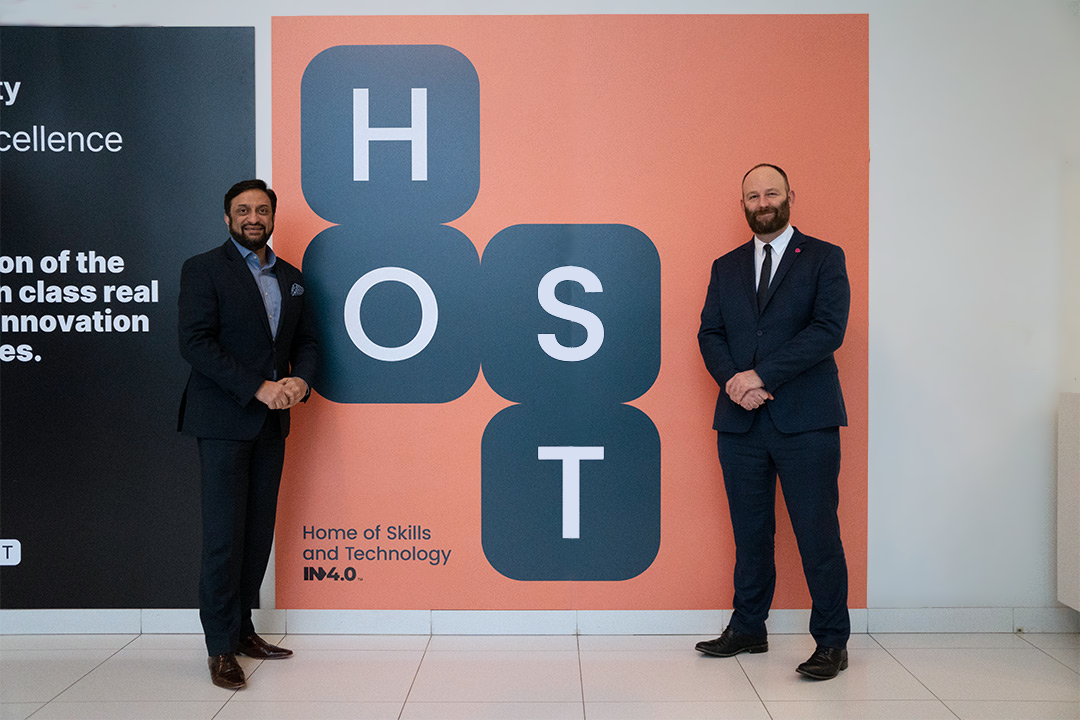
Mo Isap and Paul Dennett
How can networks of towns and cities play a leading role in levelling up through science and innovation?
Special roundtable report: Innovation Greater Manchester
A roundtable discussion addressed by Business Secretary Kwasi Kwarteng and featuring commentators from some of the UK’s leading think tanks has underlined the role for Innovation Greater Manchester in levelling up the North.
Developed by business, academia and civic leaders, Innovation Greater Manchester is a blueprint for translational innovation between Greater Manchester and Government to stimulate economic growth and boost R&D investment, creating jobs and supporting skills.
It forms a key part of the city-region’s Economic Vision, the plan to deliver a fairer, greener and more productive Greater Manchester economy.
Chaired by Chris Oglesby, interim Chair of Innovation Greater Manchester, CEO of Bruntwood and a board member with Greater Manchester Local Enterprise Partnership, the discussion began with a pre-recorded address from Business Secretary Kwasi Kwarteng.
“The Innovation Greater Manchester blueprint shows how an area can harness its strength to produce something really special,” he said. “With this region’s extraordinary focus on innovation, you are travelling in exactly the same direction as the Government.
“We have an aim of raising R&D spending to 2.4 per cent of GDP. That means that we have to have a great deal of investment in your communities and businesses in the next few years. I can assure you that as we develop our R&D Place Strategy, Greater Manchester is very much at the front and centre of our conversations.”
The Innovation Greater Manchester roundtable addressed the urgent need to close gaps in productivity, skills and opportunity between the Golden Triangle of the South East and the other UK regions, including Greater Manchester. It also examined the implications for the UK for remaining competitive internationally if the gap is not closed.
Richard Jones, Independent Science Advisor to Innovation Greater Manchester, as well as Professor of Materials Physics and Innovation Policy at the University of Manchester, said places such as Leipzig have leap-frogged the UK’s second cities on economic competitiveness.
“It’s quite astonishing that businesses in the former Communist Eastern Europe have recovered more quickly during the post-industrial period than towns and cities in the North of Manchester,” he said.
The roundtable heard that in sharp contrast to cities in Eastern Europe, the gap is growing between GDP in London and second-tier cities including Greater Manchester.
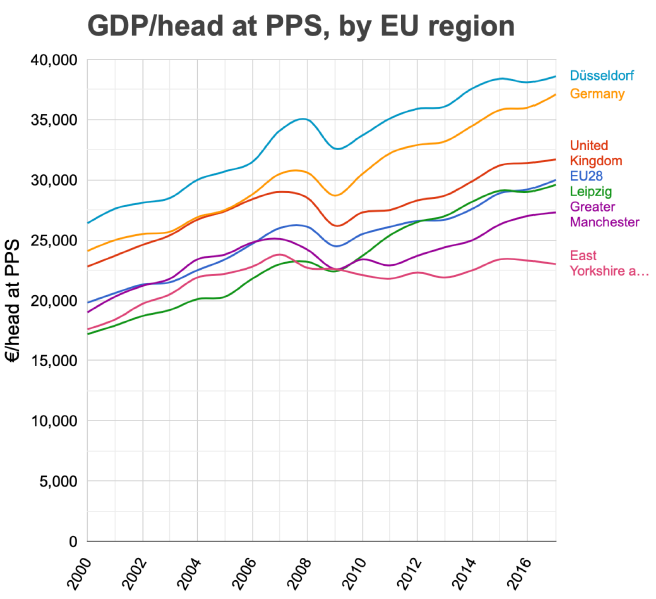
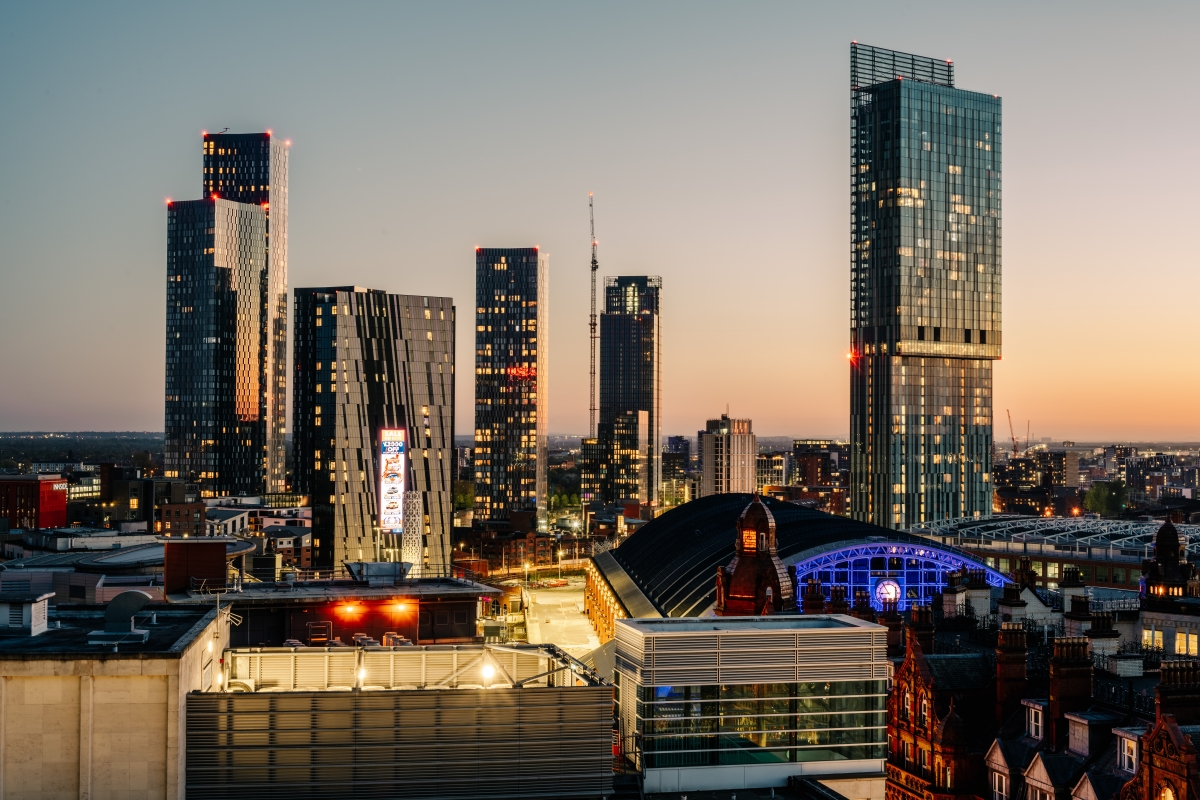
Innovation Greater Manchester
Innovation Greater Manchester is a model for creating a network of innovation zones across towns and cities and leveraging science assets and strengths to support innovation-led business growth in Greater Manchester, the North West, and the wider North.
It is a blueprint for how cities and towns across the North can work in concert for mutual broad-based prosperity, levelling up through science and innovation.
It is closely aligned with UK national policy which seeks to deliver the Government’s laudable aims of achieving 2.4% of GDP related to R&D, establishing the UK as a science superpower and supporting international trade through global Britain.
It demonstrates how deeper local-national partnerships, underpinned by shared outcomes and ring-fenced funds, can deliver more and better.
Outlining the current challenges as we recover from the pandemic, Brexit, and the transition to carbon net-zero, Professor Jones said there was an urgent need to innovate to increase R&D intensity, particularly among SMEs, and create a more joined-up system to develop skills and increase inward investment.
He referenced the weight of evidence that had gone into Innovation Greater Manchester via the work that underpins the Greater Manchester Local Industrial Strategy.
He said Greater Manchester could build on the success of planned and existing R&D hubs including ID Manchester, the Salford Innovation Triangle and Gateway North in Rochdale, which includes a planned Manufacturing Innovation Park.
He said: “Our vision is that we should do an innovation deal with the Government to help level up, innovate and really motor to make GM a lead economy. If there is a strapline, it’s that we want to find out who is doing the innovating in Greater Manchester and help them do more of it.
“At a basic level, we are bringing our innovative businesses together, and working out how we can get them to do more of that. This can best be done at the local level, with institutions and actors that know their people, places, and businesses.”
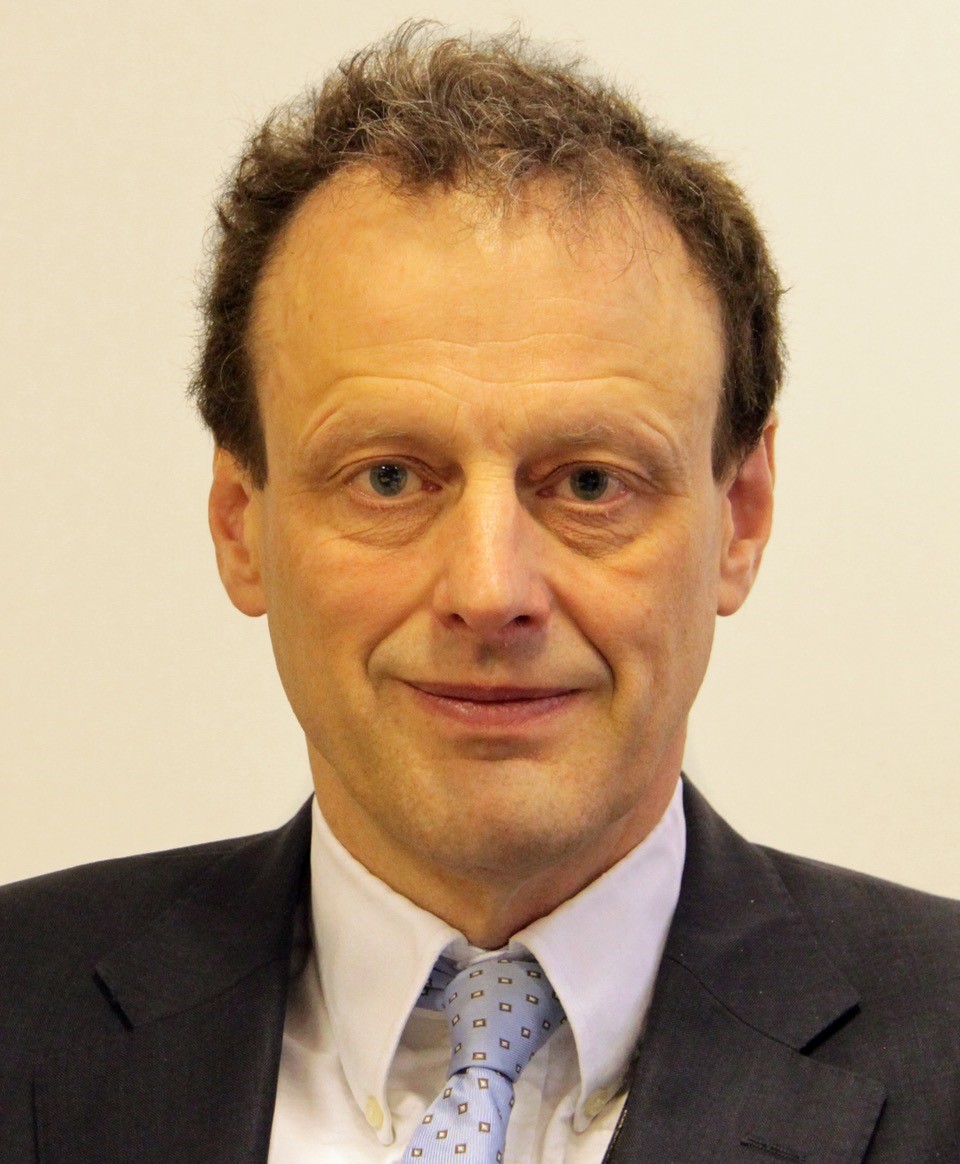
Richard Jones, Independent Science Advisor to Innovation Greater Manchester as well as Professor of Materials Physics and Innovation Policy at the University of Manchester
Carter said there were three enduring perception challenges facing Innovation Greater Manchester and that they have increased in significance, namely:
- The sense that the innovation agenda is zero-sum – that only one city can prosper
- Challenges around the elitist nature of innovation – the sense that it’s not something that impacts upon the life of the average person
- The sense that Greater Manchester is just ‘another place’ in the country, whereas, from an economic perspective, it has unique characteristics which mean it is primed for an intervention such as Innovation Greater Manchester

Kathrin Enenkel provided evidence of three reasons why Greater Manchester should be at the centre of a large-scale innovation intervention:
- Economic data proves the case – it needs to be levelled up.
- Data show that it has the potential to successfully transform investment into innovation and is the city with the strongest innovation capacity in the North of England.
- Because the city is so big, increasing its productivity would deliver a significant impact for the UK in terms of GDP as well for the people living in the area.
“We know GM is operating below potential. If Greater Manchester achieved its potential, the UK economy would be £15bn bigger.”

He said the UK had been below the OECD average for spending on R&D as a share of total GDP for some time and welcomed the Government’s target spend of 2.4% of GDP on R&D.
While Greater Manchester has performed well for venture capital investment relative to many other UK locations, the city-region falls well behind London, Holloway added.
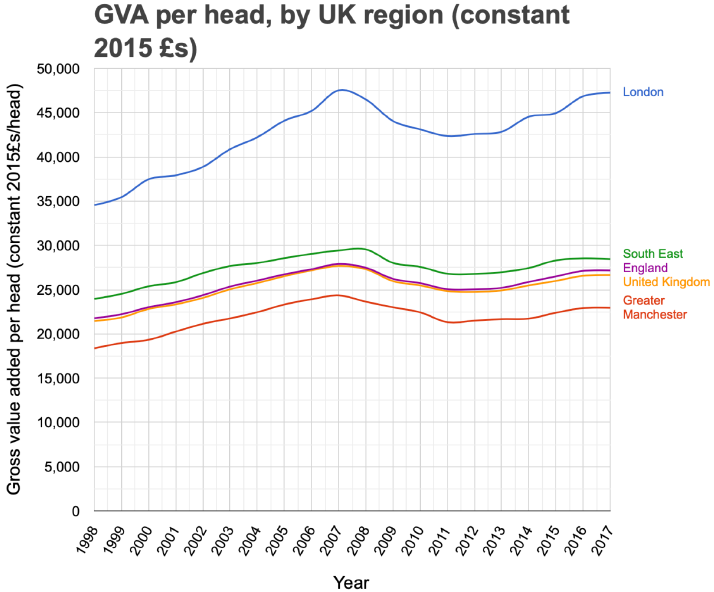
Highlighting research conducted by Onward in its Levelling Up report, Holloway said that it recommended any uplift in public R&D investment through the 2.4% of GDP target should be devoted to projects outside the “Golden Triangle” of Cambridge, London and Oxford in the South East of England.
One example of how this might be achieved is The Advanced Machinery & Productivity Institute in Rochdale, Greater Manchester (See FT article).
Part of Gateway North, it is a major project within Innovation Greater Manchester that will build globally significant machine tooling and sustainable materials translational research capacity in the North.

Citing research based on outreach between the University of Manchester and Moss Side, traditionally one of Greater Manchester’s more deprived communities, he said people from any socioeconomic background can thrive with the right opportunities.
“We have to see the potential in kids, out there in our estates, in our towns, people who have creatively jostled through lives and could be our best most creative employees,” he said.
“People have become stuck, stuck from creating new ventures, from creating new jobs, from creating roles.”
However, investing in skills and innovation would present a “double-edged opportunity”, he said, because if employers are supported to shape local skills programmes, local people will be able to access the good jobs innovation can create.
By adding “rocket boosters” to the translational aspects of R&D, we will get more employers creating those good jobs in our towns – achieving levelling up, Cook added.
In summary, Chris Oglesby said it was clear that Greater Manchester’s ambitions were clearly aligned with the Government’s and detailed the city-region’s existing industrial strengths and R&D hubs.
He said that Greater Manchester now wanted to level up towns and cities across Greater Manchester and the North, building on strong sector links.
He added: “We know that the young people of places who are being left behind are capable of thriving. We are going to innovate in a way that takes everybody with us, and Innovation Greater Manchester will help us to do this.”

HOST launches cyber and innovation programmes
The HOST technology hub in Salford has launched two unique business incubation programmes in response to post-Covid needs by building a peer powered community and bringing world-class innovation and growth opportunities to the region’s most promising entrepreneurs.
The Home of Skills & Technology at MediaCity, has opened applications for its Cyber Innovation Lab and Unity Centre of Excellence Incubator programmes for ambitious start-ups and SMEs creating innovations in cyber, data science, AI and immersive sectors.
Led by Mo Isap and Andy Beaden, who have more than half a century of combined experience in starting and scaling companies, the programmes are based on their industry knowledge and have been specially developed for entrepreneurs.
Mo, founder and CEO of IN4.0 Group and Andy, co-founder and chairman, are the operators of HOST and have a strong track record in supporting businesses to adopt digital technologies and accelerate their growth.
The 12-month programmes are part of HOST’s flexible and affordable incubation membership and will be delivered in collaboration with high profile technology partners such as Microsoft, Siemens and Unity.
The Cyber Innovation Lab incubates best-in-class cyber, data science and AI start-ups and scale-ups, and supports the rapid development of industry-leading disruptive innovations.
Key to the lab is HOST Cyber, in partnership with Salford City Council, which includes a cutting-edge cyber sandbox, allowing businesses to use real anonymised data to build, develop and test new ideas.
While the Unity Centre of Excellence Incubator Programme connects outstanding innovators with the creativity, imagination, and expertise of Unity, providing invaluable access to Unity’s technical leads, creatives and support networks.
As the only Unity Centre of Excellence in the UK, it offers regular 1-to-1 mentoring, tailored advice, workshops and hackathons, designed to help businesses get investment ready and fast track them to success.
Those involved will also be supported by HOST’s exclusive Innovation and Business Growth Programme, which equips entrepreneurs with personalised mentoring and the tools they need to successfully bring their products to the commercial market.
The programme has been developed from years of experience, analysis and reviews of business support, incubation, accelerator and growth programmes.
Businesses will also join HOST’s collaborative innovation community where founders are introduced to funding options and given exposure to its partnership network, including 250 businesses across MediaCity and the Greater Manchester Chamber of Commerce’s 4,500 members through events and marketing opportunities.
HOST’s mission is to break the barriers to entry into the tech sector, enabling businesses of all sizes to scale up and drive economic growth by creating one of the most inclusive technology communities in the world.
Mo Isap, CEO of IN4.0 Group, operators of HOST, said:
“We’re offering entrepreneurs a home at HOST, not just a location, but a place where they can become part of our supportive and inclusive innovation community. People, place and culture are at the heart of everything we do.
“Having been on my own personal journey as an entrepreneur from starting businesses to then building them up, I understand how both tough and rewarding the journey can be, but also no one else understands what you go through as a business owner like your fellow entrepreneurs. I’m privileged to be able to share that experience and the knowledge I’ve gained along the way with others who might be coming up against the same hurdles.”
HOST member Dr John Hardy, Director of HE Inventions, said:
“At HOST you are part of a community where there is always something new and interesting going on, with plenty of enjoyable events and initiatives to take part in that expand your network. It’s great for our customers and colleagues alike to be in such an inspiring and energetic environment, while being in the heart of MediaCity helps us to attract the best people in the region.”
Businesses interested in applying for HOST’s programmes can find out more here: www.hostsalford.com
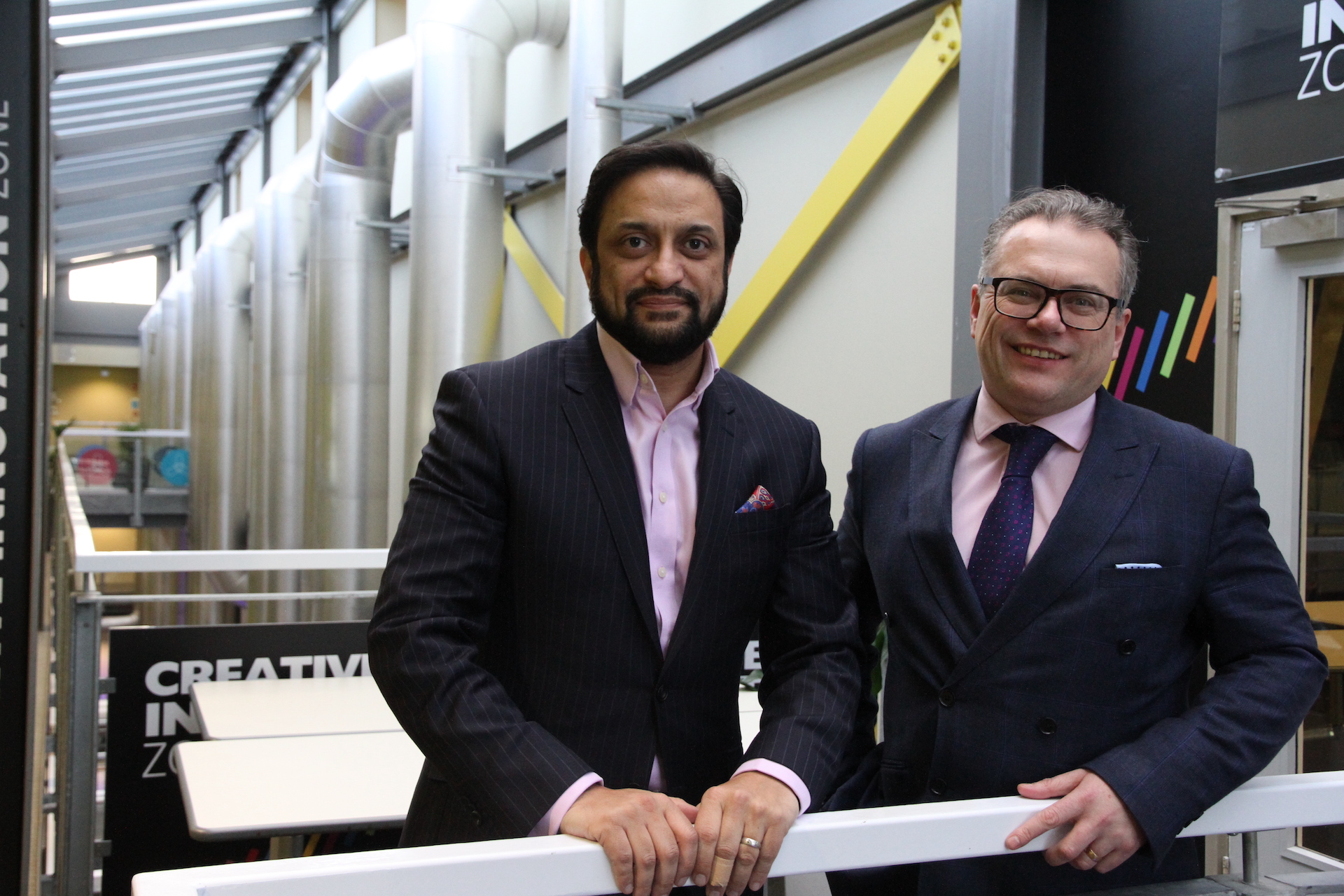
Mo Isap and Andy Beaden
Graphene concrete provides foundations for more sustainable construction
Greater Manchester research into 2D materials supports innovation in building materials which could help to reduce the global construction industry’s carbon footprint.
Concrete strengthened with graphene to make it more sustainable has been laid for the first time in a commercial setting, demonstrating how the carbon footprint of construction works can be significantly reduced in future.
Production of conventional concrete currently accounts for around 8% of global C02 emissions annually.
However, the amount of concrete required to meet construction criteria falls significantly with the addition of graphene – a 2D material first isolated at the University of Manchester.
A joint venture between the University of Manchester and construction company Nationwide Engineering led to the production of Concretene.
The addition of tiny amounts of graphene strengthens Concretene by around 30% compared to standard concrete, meaning significantly less is needed to achieve the equivalent structural performance, reducing carbon footprint and costs.
The additional strength also reduces the need for steel reinforcement, saving material and time on site and further promoting the green credentials of this building method.
Nationwide Engineering estimates that an additional cost of 5% for Concretene will be offset by the reduction in material to deliver an overall saving of 10-20% over standard RC30 concrete.
In May, Nationwide Engineering laid the first Concretene slab during construction of the new Southern Quarter gym in Amesbury’s Solstice Park – owned and run by military veterans and due to open in summer 2021.
Alex McDermott, co-founder and managing director of Nationwide Engineering, said:
“We are thrilled to have developed and constructed this game-changing, graphene-enhanced concrete on a real project.
“Together with our partners at The University of Manchester’s Graphene Engineering Innovation Centre (GEIC) and structural engineers HBPW Consulting, we are rapidly evolving our knowledge and experience and are positioned for wider industry deployment through our construction frameworks, becoming the go-to company for graphene-enhanced concrete.”
Nationwide Engineering has three existing five-year construction frameworks with Network Rail and two seven-year Government Crown commercial building frameworks.
With Network Rail committing to an 11% reduction in CO2 emissions over the next four years, graphene-enhanced concrete shows significant potential to help meet this target.
Supported by significant infrastructure investment – including £5m in GM LEP funding for the GEIC– Greater Manchester has become a global centre for research in the applications for graphene and other 2D materials.
Concretene: How it works
Liquid concrete sets into its solid form through chemical reactions known as hydration and gelation, where the water and cement in the mixture react to form a paste that dries and hardens over time.
Graphene makes a difference by acting as a mechanical support and as a catalyst surface for the initial hydration reaction, leading to better bonding at a microscopic scale and giving the finished product improved strength, durability and corrosion resistance.
Crucially, Concretene can be used just like standard concrete, meaning no new equipment or training is needed in the batching or laying process, and cost-savings can be passed directly to the client.
Dr Craig Dawson, Application Manager at the Graphene Engineering Innovation Centre, explained:
“We have produced a graphene-based additive mixture that is non-disruptive at the point of use.
“That means we can dose our additive directly at the batching plant where the concrete is being produced as part of their existing system, so there’s no change to production or to the construction guys laying the floor.
“We have been able to do this via thorough investigation – alongside our University colleagues from the Department of Mechanical, Aerospace and Civil Engineering – of the materials we are using and we can tailor this approach to use any supplier’s graphene, so we are not beholden to a single supplier.
“This makes Concretene a more viable proposition as there is increased security of supply.”
At Amesbury, an initial pour of 234m2 of Concretene was conducted on-site on 6 May, with a further 495m2 laid on Tuesday 25 May to complete the concrete floor slab.
The graphene used for the pour on 25 May was supplied by Versarien plc.
Nationwide Engineering will manage and monitor the site during its fit-out and onward operation, effectively creating a ‘living laboratory’ at Southern Quarter to measure and evaluate the performance of the material.
This project has been funded by Innovate UK and the European Regional Development Fund’s Bridging the Gap programme as a joint venture between Nationwide Engineering, The University of Manchester’s Graphene Engineering Innovation Centre (GEIC) and Department of Mechanical, Aerospace and Civil Engineering (MACE).
The GEIC is a £60m facility at The University of Manchester. It opened in 2018 and dedicated to the commercialisation of graphene and other advanced materials.
Graphene was first isolated at the University in 2004 by two Russian scientists – Andre Geim and Kostya Novoselov – who subsequently won the Nobel Prize for Physics in 2010 for their work on this new material.
Apart from being incredibly strong, graphene is also flexible, see-through and highly thermally and electrically conductive, leading to numerous technological and engineering applications, from anti-corrosion coatings and advanced telecoms to new treatments for cancer.
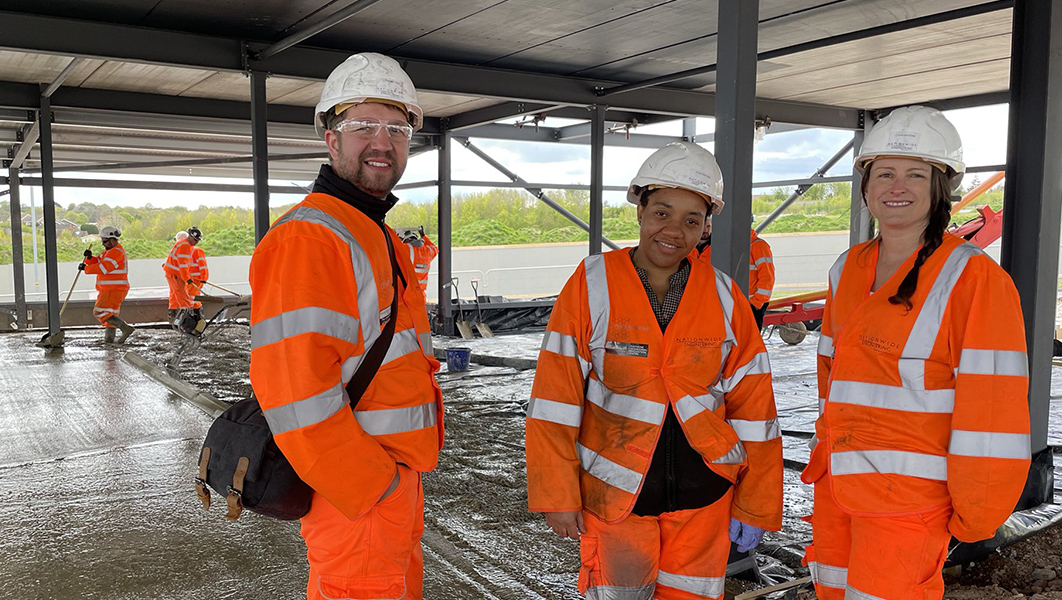
Graphene@Manchester team on-site in Amesbury (l-r): Craig Dawson, Happiness Ijije, Lisa Scullion
Greener, cheaper concrete – how graphene can solve the building industry’s sustainability problem
How Greater Manchester became the land of tech unicorns and eCommerce giants
The landmark flotation of The Hut Group has underlined Greater Manchester’s success as a platform for digital innovation and growth. But what makes the city-region such a successful home for tech unicorns and eCommerce giants?
In September 2020, The Hut Group (THG) achieved the highest value flotation of any British company since the UK government had sold the shares of Royal Mail in 2013.
Raising £1.88bn through the sale of shares on the London Stock Exchange, the flotation provided THG with a valuation of £5.4bn which has since risen to £7.3bn, with investors convinced that even bigger things lie ahead.
Whatever comes next for THG will be driven from its new headquarters at Manchester Airport, where the group is investing $1bn to develop two sites, including the UK’s biggest ever bespoke office project outside of London.
THG’s new landmark business campus, THQ, will span 280,000 sq ft and provide up to 10,000 jobs while ICON, its content creation studio, will be over 11.6 acres with more than 2,000 staff.

The Greater Manchester Digital Blueprint provided details of the fast-growing £5bn digital ecosystem in Greater Manchester and how the region is doing digital differently.
It builds on the sprawling network of digital and physical assets which make THG a shining example of end-to-end eCommerce success, with expertise, developed over 15 years harnessed to build, market, sell and deliver products to people across the world.
Turnover at the end of 2019 trading had hit more than £1.1bn and the company already employed 7,100 people. During the year ended 31 December 2019, more than 610 million visits were made to websites on the THG Ingenuity platform and more than 80 million units were dispatched using its infrastructure.
Matthew Moulding and John Gallemore founded The Hut Group in 2004 with a £500,000 investment and a hunch about the future potential popularity of online selling.
An accountant by trade, Moulding, THG’s Chief Executive and majority shareholder, had previously worked for John Caudwell’s Phones4U group, and suggested an eCommerce idea which was rejected, so took the opportunity to try it for himself.
The experiment started with the sale of entertainment products online but quickly pivoted to health and beauty product ranges, which appeared to appeal the burgeoning number of online shoppers, promised strong profit margins and could be cheaply delivered to the door.
Success in creating, buying and building brands favoured by digital consumers led THG to begin white labelling its eCommerce offer to major household name brands who needed help in taking their products online, including Zavvi, Tesco and ASDA.
A decade on, THG has every step in the eCommerce consumer journey covered via a range of divisions centred around THG Ingenuity its proprietary end-to-end eCommerce technology and operating platform.
The empire includes vast logistics warehouses, specialist digital marketing insight and expertise, digital content hubs where products become the stars of social media clips shared with millions, and even a portfolio of luxury hotel and leisure destinations where the world’s growing army of Instagram influencers can be tempted to support views of the latest beauty products.
Dotted across Greater Manchester, they include Hale Leisure Club, the Great John Street Hotel, King Street Townhouse and the iconic Art Deco 100 King Street, which was formerly home to the Midland Bank and Jamie’s Italian.
Amid concerns about logistics issues during the pandemic, THG did what any self-respecting eCommerce giant would do, sealing a deal with Singapore Airlines to launch its own airline, THG Air.
Matthew Moulding, CEO and Chairman, THG, said:
“Manchester is a great location for our HQ because of its world class infrastructure, access to talent and global supply chains. THG is both a significant business and employer in the UK, and particularly, in the North. Although we are currently rapidly building out global operations, we intend to significantly accelerate our rate of investment in the region, attracting and retaining the most innovative and inventive talent from across the globe.”
Prior to its flotation, THG had become known to tech investors as a unicorn, the term used in the venture capital industry to describe a privately-owned start–up company with a value of over $1 billion.
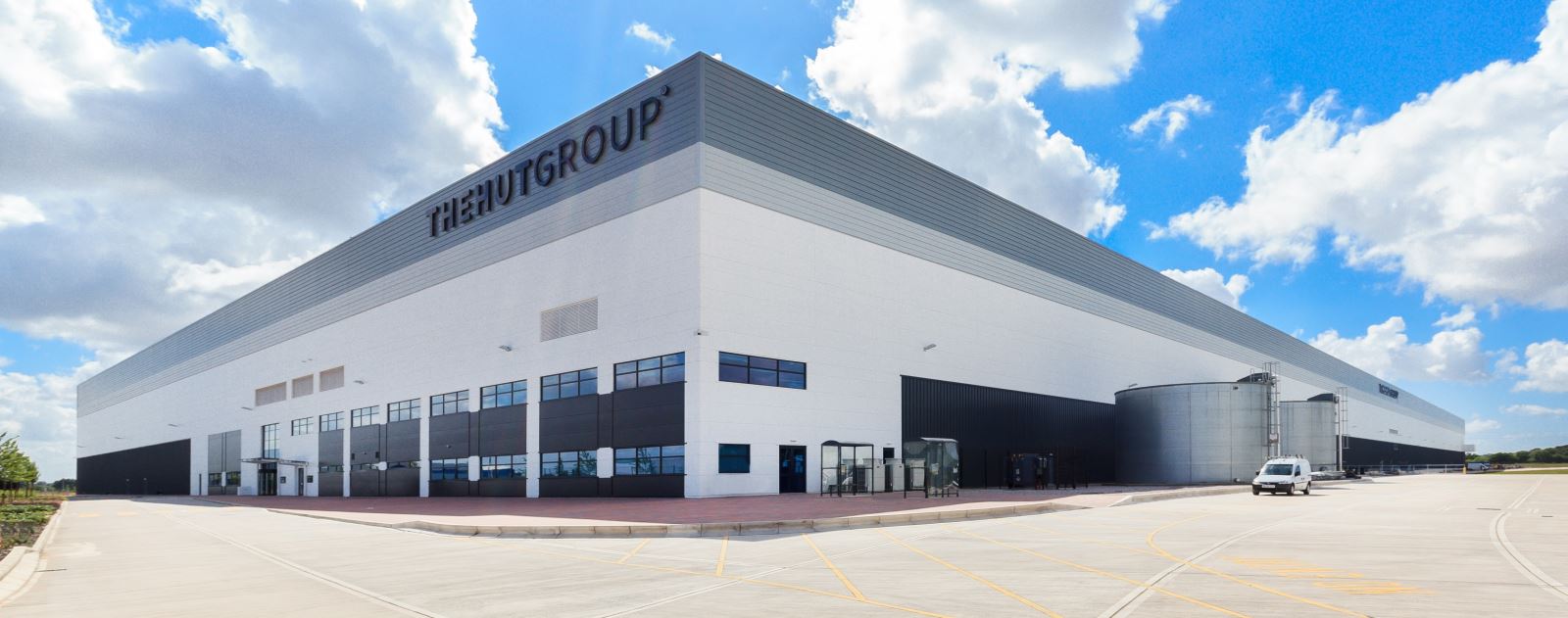
As the name suggests, unicorns are rare beasts, but Greater Manchester is home to no fewer than five. Living in perfect harmony alongside those unicorns are eCommerce giants including AutoTrader, Boohoo and Booking.com, and retailers including AO.com.
So just why has Greater Manchester become the land of unicorns and eCommerce giants?
According to a new report from London Tech Week and the UK Tech Cluster Group, North-West England is the “perfect breeding ground” for technology start-ups and scaleups because of its entrepreneurial climate, academic connections and growing investment activity.
The 12 Clusters of Tech: North West report details Greater Manchester’s prominent role in attracting inward investment and providing a platform for start-ups.
It says that the North West is attracting ever greater international attention, with companies like Amazon, Microsoft and Booking Holdings all building a presence, and singles out the homegrown success of businesses including THG.
Factors fuelling tech clusters in Greater Manchester and the North West include ‘tech talent and entrepreneurial spirit’, universities and the dedicated support available to tech companies, with particular specialisms, including Citylabs in Manchester, and GCHQ’s Manchester office.
The report states that the North West’s increasing confidence as a technology hotspot is reflected in growing investment activity too. According to Beauhurst, there were 389 announced and 502 unannounced tech investment deals in Greater Manchester alone between 2011 and 2020.
Of the 14 unicorns in the UK, two were founded in the North West and three have expanded here. Alongside THG, other Greater Manchester unicorns include AO.com, AutoTrader and Boohoo, while Crewe-based Radius Payment Solutions operates a technology centre in Manchester.
Interestingly, Greater Manchester’s eCommerce success includes a mix of relatively recent start-ups and more established organisations which have undergone successful digital transformation.

Notable among the companies to have undergone digital transformation is AutoTrader, which launched more than 40 years ago as a weekly print publication containing car sales advertising.
Headquartered in Tony Wilson Place, Manchester, AutoTrader evolved from an entrepreneurial print media business into one of the UK’s leading digital businesses.
Listed on the London Stock Exchange in 2015, AutoTrader has a market capitalisation of £5.85bn and employs around 850 people across offices in Manchester, London, High Wycombe and Dublin.
AutoTrader achieves 50.1m cross platform visits each month online and lists more than 470,000 cars each day.
Other factors underpinning Greater Manchester’s success arguably date back to the cotton trade.
Historically, textiles were central to Manchester’s industrial boom and the city was the prime location for weavers and cotton traders.
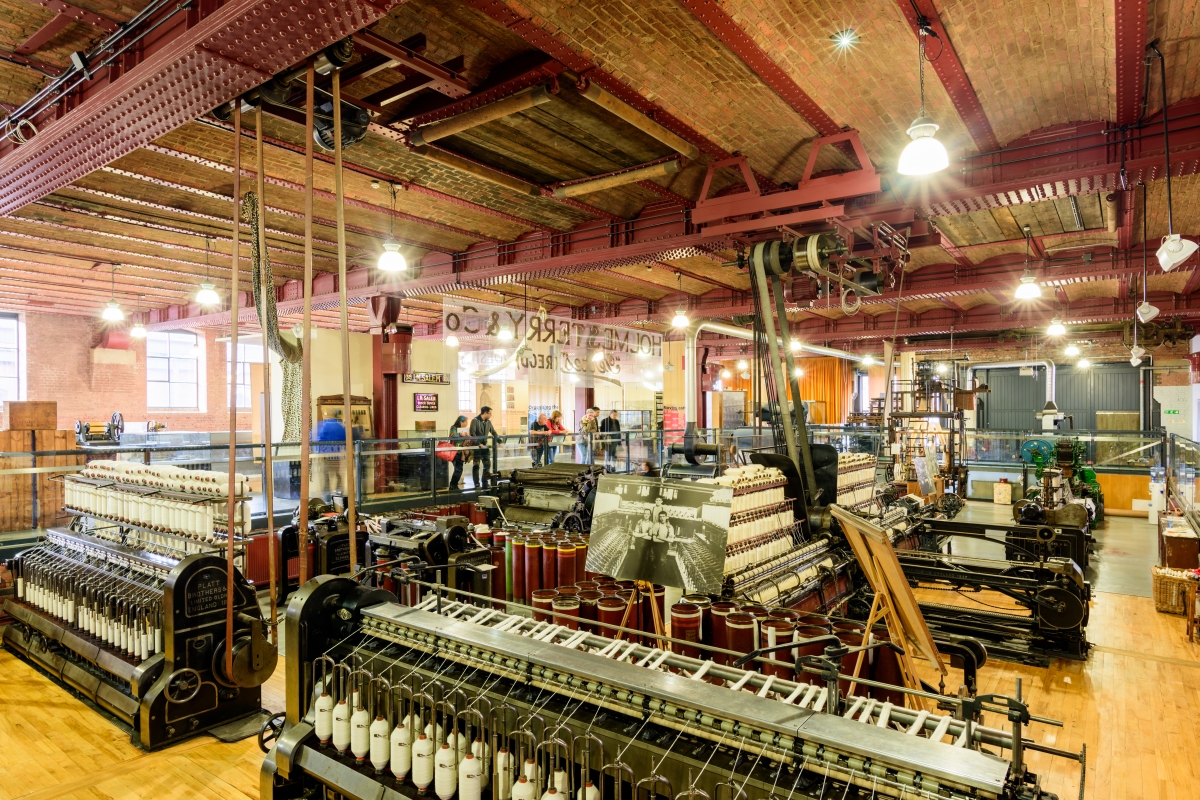
Today, Manchester, a mecca for cutting edge, innovative digital companies, has been referred to as a 21st Century Cottonopolis – a revival of its historic moniker. This follows the emergence of eCommerce and the success of its global brands including the unicorn Boohoo, Missguided, Lavish Alice and Pretty Little Thing.
In the space of 15 years, Boohoo has gone from a three-employee operation to a business with sales of £1.2bn and a 5,000-strong workforce.
As traditional retail has declined, Boohoo’s stock has risen and so far in 2021, Boohoo has acquired the eCommerce and digital assets of a portfolio of iconic High Street brands including Debenhams, Burton, Dorothy Perkins and Wallis.
Another eCommerce success story in Greater Manchester is AO.com, which began when founder and Chief Executive John Roberts accepted a £1 bet from a friend that he could change the way white goods are purchased via the internet.
Similar to THG, AO.com developed an end-to-end eCommerce offering – including logistics and digital content production – which attracted the interest of third–party retailers including Marks & Spencer, Argos and B&Q.
AO.com acquired its own logistics business and opened an in-house video production facility which produces video reviews of appliances.
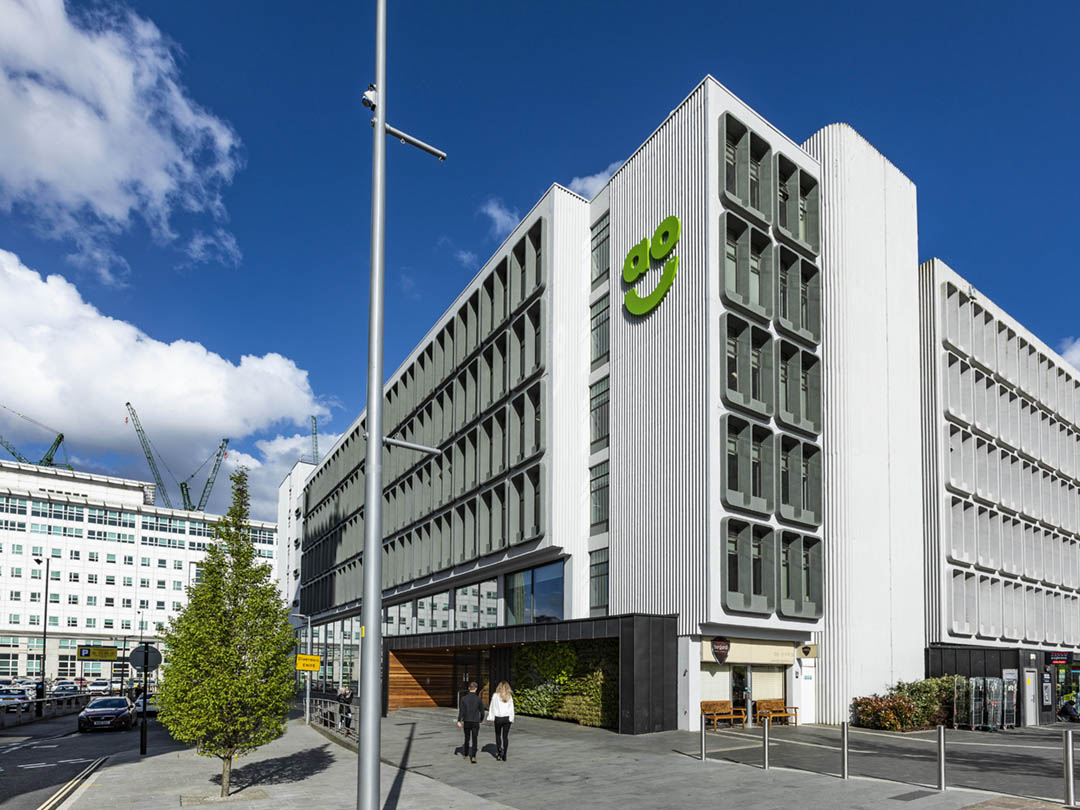
Today, listed AO World PLC has a market capitalisation of £1.48bn, employs over 3,000 people and makes 72,000 deliveries per week. It is headquartered in Bolton, Greater Manchester.
All of this activity supported Greater Manchester in cementing its reputation as the fastest-growing European tech city, with venture capital investment of £530m in 2019.
An increase of £153.22m on 2018 VC tech investment, it means that Greater Manchester has overtaken Cambridge as the UK’s most attractive city for tech investment outside London.
While the full impact of the coronavirus pandemic on global tech investment is not yet clear, Manchester tech investment continued to thrive in 2020, in part thanks to the successful IPO of THG, which demonstrated the calibre of tech companies across the region.
The strength of Greater Manchester’s digital and creative industries was cited in the Greater Manchester Local Industrial Strategy agreed with Government in 2019. This was reinforced with the publication of the Greater Manchester Economic Vision in 2021.
Lou Cordwell, Chair of Greater Manchester Local Enterprise Partnership, said:
“Greater Manchester’s rich history of digital innovation has provided the perfect platform for today’s tech and e-commerce success stories, attracting talent and investment and creating thousands of jobs.
“The Greater Manchester Economic Vision includes plans to further harness the opportunity that digital provides to deliver economic recovery and growth locally and on behalf of UK Plc.
“Supporting training, skills and innovation within emerging sectors of the digital economy will ensure that everyone can share the benefits that digital innovation can bring, while helping the UK achieve its ambitions for international trade.”
Through the Local Industrial Strategy, Greater Manchester aims to build on its position as a leading European digital city region, to maximise growing assets in cyber security and capitalise on the links between digital, creative and other industries in the city-region that feed innovation in broadcasting, content creation and media, as well as in eCommerce, FinTech and other new technologies.
MIDAS, the city’s dedicated investment promotion agency, has a strong track record of supporting and de-risking investment projects into Manchester.
Tim Newns, CEO of MIDAS, said:
“The pandemic has rapidly accelerated growth within the eCommerce and retail tech industry and with such a strong standing in this sector – as well as supporting industries and technologies including FinTech, service design and AI – Greater Manchester is the perfect location for ambitious firms.”
Being the largest creative, digital and tech hub outside of the capital, Manchester is home to a thriving community of businesses that sit side by side in the city’s digital and technology clusters, incubators and co working spaces, where they converge, collaborate and drive innovation.
New start-ups are joining that community all the time, while eCommerce businesses with an international presence understand the value of a Manchester base.
In January 2021, European travel giant Awaze reaffirmed its commitment to Greater Manchester with plans for 75 new jobs.
The continent’s leading managed vacation rentals and holiday resorts business has already recruited 25 new team members since starting operations at Dalton Place in October, but new roles in technology, revenue management, marketing, commercial and legal will see its city workforce swell to at least 100 by the end of next year.
Early in 2020, Greater Manchester launched the GM Digital Blueprint, setting out the next chapter in the city region’s ambition to be recognised as a world leading digital location. Building on existing strengths, Greater Manchester is now working to strengthen its digital talent pipeline and its world class digital infrastructure.
This can only make Greater Manchester more attractive to tech and eCommerce companies, with ambitious start-ups already following in the footsteps of THG, AutoTrader and Boohoo.
In November 2020, Beauhurst published an article revealing the Hottest Tech Companies in Manchester. It said the county of Greater Manchester is home to 1,468 high-growth private companies altogether, and over a third of these are technology and IP-based businesses.
Beauhurst said Manchester’s tech scene has also seen a general rise in the total value of fundraisings since 2014, with strong peaks of £400m in 2017 and £316m in 2019.
An increasing number of venture capital firms and angels with relevant domain expertise are now active in the area. And North West companies seem increasingly successful at engaging with investors in London, the USA, and beyond. Funding availability is one factor highlighted by Beauhurst.
And others are already following in the footsteps of the eCommerce giants and tech unicorns. Among Beauhurst’s ‘ones to watch’ is the eCommerce support business Shopblocks, which is effectively a one-stop shop for setting up an online store, and Clicksit, which has developed an app that allows users to track parcels, particularly when making returns to eCommerce companies.
Watch this space for the next generation of tech giants and eCommerce unicorns.
Why Manchester is the perfect location to build a digital business
For more than 250 years, Manchester has been creating and shaping the future.
Birthplace of the Industrial Revolution and the first stored program computer, Manchester continues to be a place where creativity and technology are jointly driving the next wave of innovation.
Manchester has seen phenomenal growth in the number of online retailers based in the city region and it is home to the UK’s greatest concentration of eCommerce start-ups.
The city region provides access to specialists in front and backend development, data analytics and marketing and PR and its central location and outstanding connectivity make it easy for eCommerce companies to ship goods nationally and globally and the city; making Manchester the ideal location for eCommerce companies to thrive.
As well as being home to a fast growing £5 billion digital ecosystem, Manchester is officially the UK’s Top Digital Tech City, with ambitions to become a top five European digital city and global influencer.
Being the largest creative, digital and technology hub outside of London, Manchester has a thriving community of more than 10,000 digital and tech businesses from start–ups and SMEs to global brands including Google, Microsoft, IBM and Cisco.
In addition, the city’s globally recognised strengths in broader sectors including financial services, advanced manufacturing and life sciences provide digital and technology companies with outstanding market opportunities.
Boasting excellent connectivity 30–40% lower operating costs than the capital and an unrivalled quality of life offer (in 2019 The Economist crowned it the Best UK City to Live) Manchester is the ideal city to attract top talent from across the UK and the world.
The UK has the most advanced eCommerce market in Europe. According to the Office for National Statistics, the country’s eCommerce revenue amounted to £688.4 billion in 2018 a sharp increase on the year prior.
Greater Manchester is firmly at the forefront of the UK industry having produced five homegrown eCommerce unicorns (companies that IPO at or above $1 billion) including Boohoo, The Hut Group, AO com, AutoTrader and On the Beach which have been joined by world leading eCommerce companies such as Amazon, Booking.com and MoneySuperMarket.
Manchester is unique in that it offers wide market access and demand, specific technology strengths to serve eCommerce companies, a highly developed infrastructure, a skilled workforce, and a diverse and thriving ecosystem of companies supplying into it.
Manchester’s entrepreneurial attitude is reflected by the success of its unicorns is also very welcoming of fast–growing eCommerce companies and suppliers into its established ecosystem It is also a great base for them to internationalise.
Manchester is at forefront of the UK eCommerce industry with over 3,000 eCommerce and related companies based in the city. This includes five homegrown eCommerce unicorns and the greatest concentration of eCommerce start-ups than anywhere else in the UK.
Manchester’s large eCommerce companies are actively looking to partner and work with innovative companies who can add value to their business and ultimately their customers.
Manchester is rich in specialist talent and skills that digital and technology businesses need to thrive, with 86 000 people currently employed in the city’s creative, digital and technology industry.
It also has one of the largest and most diverse student populations in Europe, allowing businesses to tap into an emerging labour force.
Of those studying in Greater Manchester, 14 725 are enrolled in technology related courses as well as industry led apprenticeships and training programmes providing businesses with access to a wealth of specialist skills.
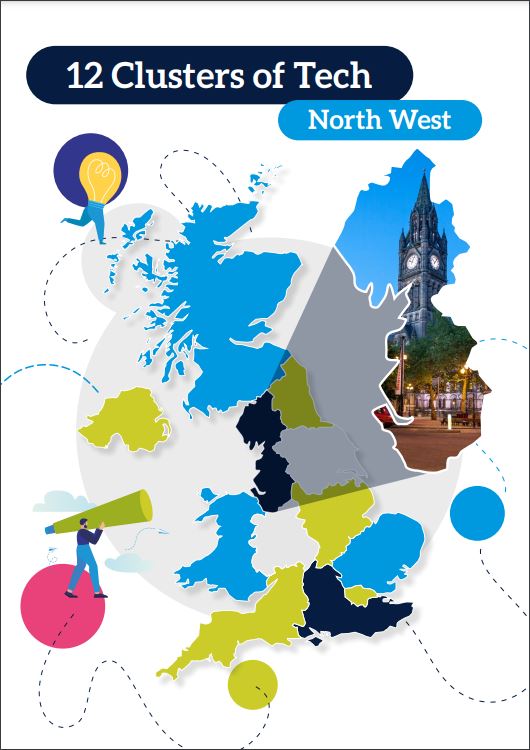
12 Clusters of Tech North West
Click here to access the 12 Clusters of Tech North West report by London Tech Week and the UK Tech Cluster Group, which includes a series of case studies.
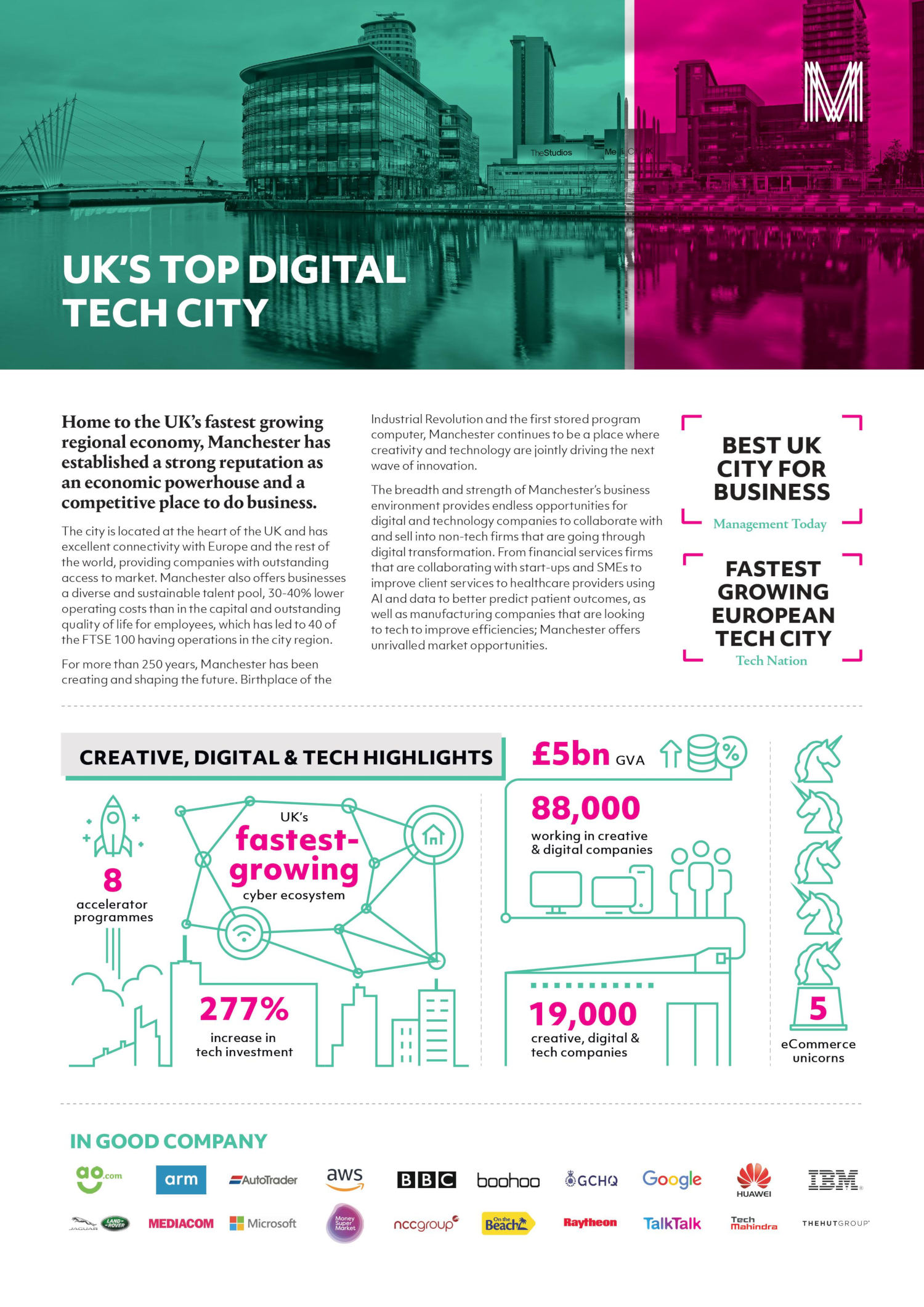
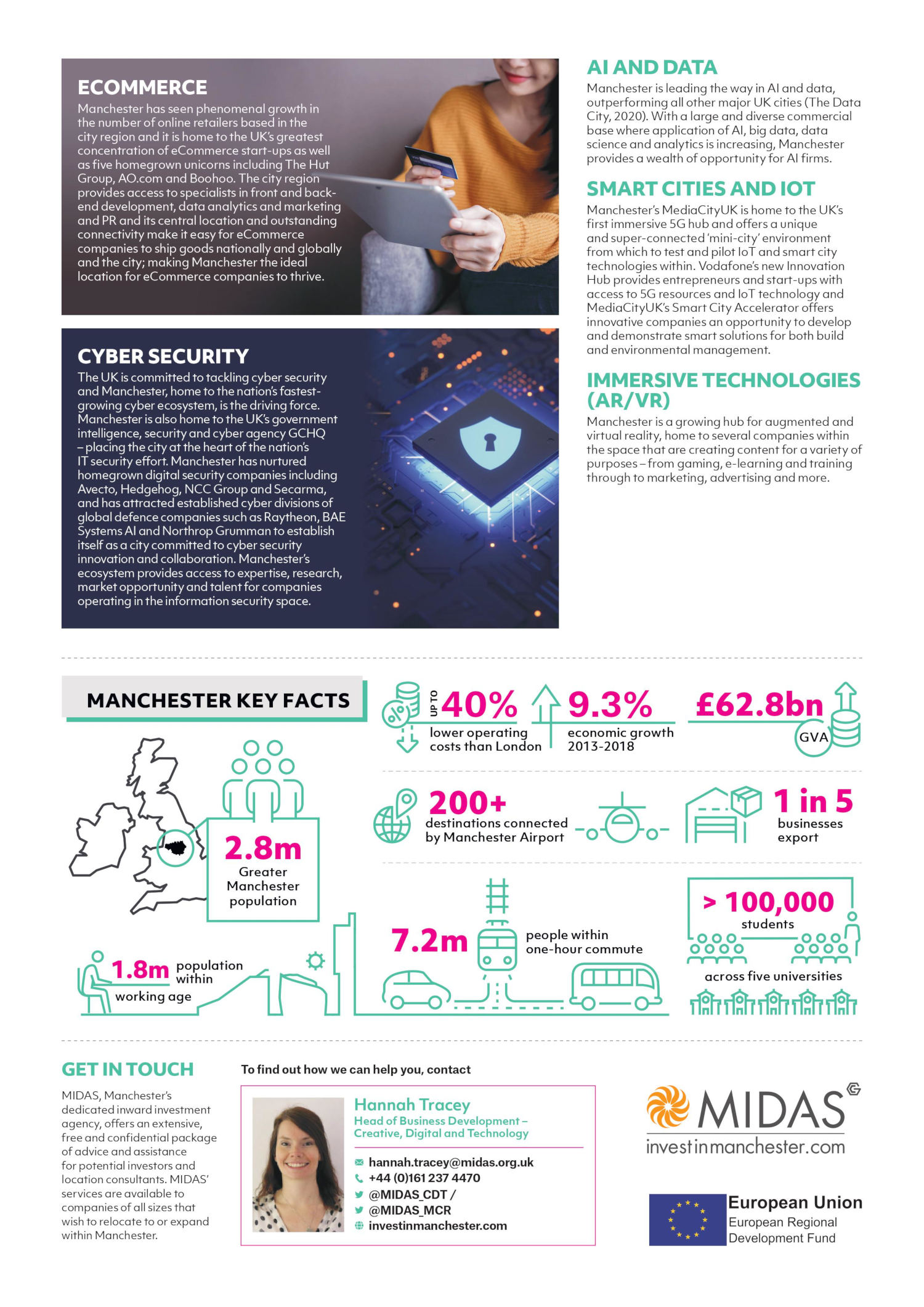
UK’s Top Digital City
Click here to find out more about how MIDAS can support you in locating a digital, tech and creative businesses in Greater Manchester.
Low carbon projects secure Ofgem Green Recovery grants
Investment will support Greater Manchester’s ambitions to achieve net carbon neutrality by 2038
Energy regulator Ofgem has announced millions of pounds in funding for low carbon projects in Greater Manchester.
The funding is part of a £300m investment for over 200 low carbon projects to get Britain ready for more electric transport and heat.
It will support Greater Manchester’s ambitions to achieve net carbon neutrality by 2038.
Electricity North West submitted 11 successful proposals at a total investment value of £20.8m.
Greater Manchester projects are:
• Greater Manchester electric heating enabler (£2.5m): investment to support programme of reinforcement work and service unlooping to accommodate additional Low Carbon Technology connections arising from GMCA’s 2038 net-zero targets, including installation of heat pumps into social housing estates and high occupancy residential buildings.
• Heywood Birch area strategic reinforcement (£0.7m): laying 2 x 4km cables to increase network capacity and help facilitate new connections, including Electric Vehicle (EV) charging at Birch MSA and future low carbon technologies around Birch Business Park.
• Ancoats and Eastlands (£0.78m): investment in 6.6kV cable from the expanded Eastlands primary substation towards New Islington to increase network capacity for local economic development plans.
Electricity North West will also use the funding to upgrade monitoring of electricity substations and network reinforcement for EV charging hubs.
Visit Ofgem for further information here and click here to find details of all the green scheme decisions.

